Marine Mammal Research Program
- Report Mammal Strandings
- Manatee Sighting Network
- Population ecology of West Indian manatees in northern Gulf of Mexico waters
- Alabama Marine Mammal Stranding Network
- Consortium for Advanced Research on Marine Mammal Health Assessment (CARMMHA)
- Bottlenose Dolphin Distribution and Abundance in Mobile Bay, Alabama
- Educational Materials
The Dauphin Island Sea Lab’s Marine Mammal Research Program conducts primary research and monitoring of marine mammals (cetaceans and manatees) that reside in or visit the north-central Gulf of Mexico and surrounding waters through which they travel.
Our research program focuses on marine mammal health and ecology, with a goal to understand the habitat and resource use, food web interactions, movement patterns and migration, and threats and causes of stranding or death.
Our program includes DISL’s Manatee Sighting Network, the Alabama Marine Mammal Stranding Network, and other related research projects. In addition to enhancing our basic understanding of marine mammal ecology, we provide data to guide the management and conservation of marine mammals and their habitat.
The DISL Marine Mammal Research Program team would love to see photos of your students using our educational resources. We also welcome feedback to improve the resources provided. Reach out to our team at manatee@disl.edu.
Report Marine Mammal Strandings
- For dolphin and whale strandings (live or carcasses) call 1-877-WHALE-HELP (877-942-5343).
- For manatee strandings (live or carcasses) call 1-866-493-5803.
- Report manatee sightings to DISL’s Manatee Sighting Network at manatee.disl.org.
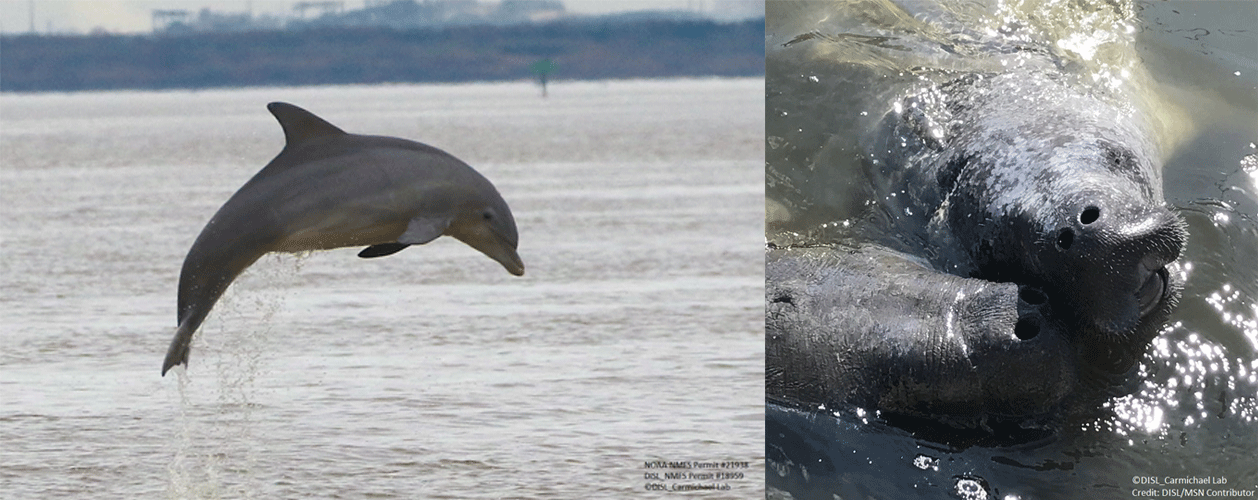
Manatee Sighting Network
The Dauphin Island Sea Lab’s Manatee Sighting Network (DISL/MSN) is the only formal network to receive and track manatee sightings in the northern Gulf of Mexico. DISL/MSN research focuses on defining where manatees go and what they eat while visiting Alabama and surrounding waters. The network is dedicated to sharing data with other researchers, managers, and the public to support recovery efforts for West Indian manatees across their range.
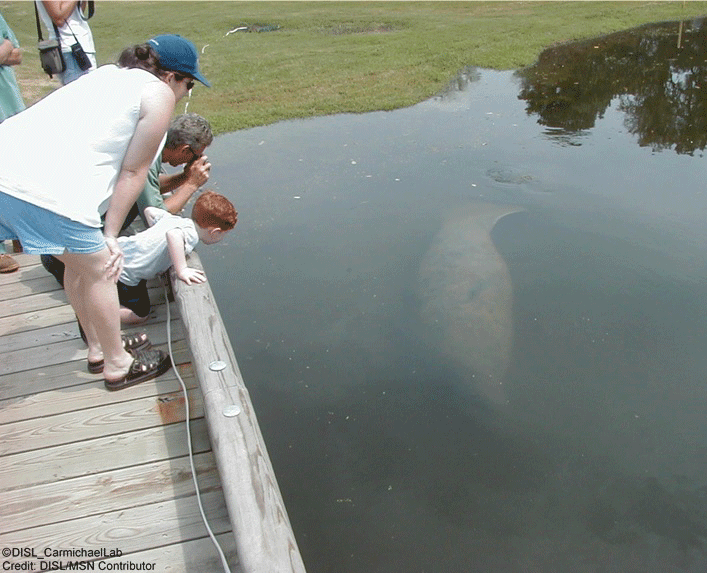
MSN was founded in 2007 as a collaboration among researchers at the Dauphin Island Sea Lab and Sea to Shore Alliance in Florida. Since it started, the network has successfully processed more than 4,000 manatee sightings and serves as the sighting clearinghouse in the northern Gulf of Mexico.
You can support DISL/MSN’s mission by reporting manatee sightings by phone at 1-866-493-5803, online at manatee.disl.org, or via email at manatee@disl.org. Follow us on Facebook as Mobile Manatees Sighting Network.
Population ecology of West Indian manatees in northern Gulf of Mexico waters
This suite of projects includes photo-identification, aerial and ground surveys, tagging and tracking manatee movements, habitat and food resource characterization (application of stable isotope techniques), analysis of population data, and comparison to habitat and food supply data. We are particularly interested in the function of manatees in the northern Gulf of Mexico, outside of Florida as sentinel species to detect and predict ecosystem-level responses to environmental change, including how climate change may affect habitat and food resources while simultaneously promoting habitat or range re-expansion.
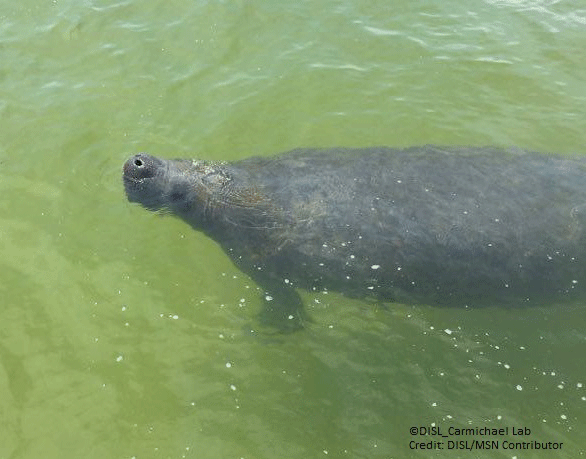
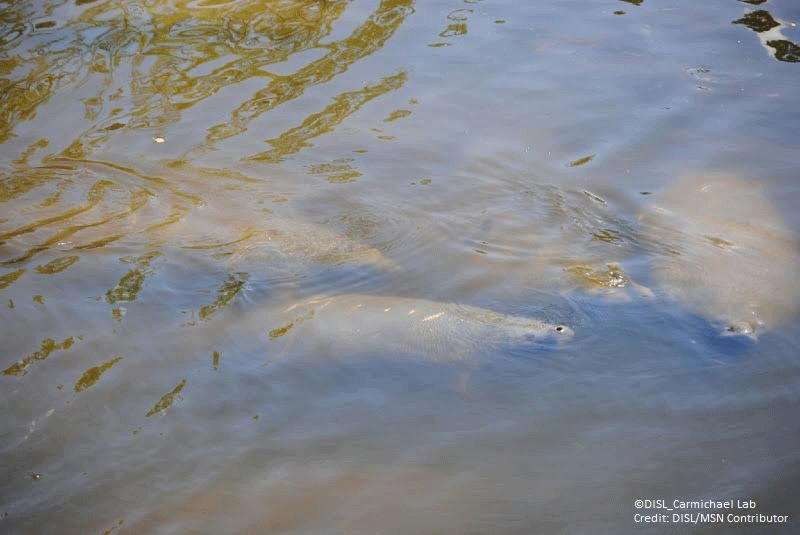
Specifically, data will inform stakeholders about when and where manatees occur in local waters, increase awareness for manatees in the region, identify recovery priorities with the U.S. Fish & Wildlife Service, contribute to ongoing recovery efforts, and reduce the likelihood of strandings or conflicts between manatees and people.
Projects have received funding from the Alabama Division of Wildlife and Freshwater Fisheries, U.S. Fish and Wildlife Service (USFWS), Northern Gulf Institute, Seamen’s Foundation, Mobile Bay National Estuary Program, and the Gulf of Mexico Energy Security Act (GoMESA). Project collaborators include Sea to Shore Alliance/Clearwater Marine Aquarium, SeaWorld Orlando, University of Florida, Florida Fish and Wildlife Conservation Commission (FWC), and the USGS Sirenia Project.
Alabama Marine Mammal Stranding Network
If you encounter a stranded, injured, or dead marine mammal, call 1-877-WHALE-HELP.
The Alabama Marine Mammal Stranding Network (ALMMSN) is a cooperative regional stranding network partner working in conjunction with NOAA’s National Marine Fisheries Service to respond to dolphin and whale strandings in Alabama and U.S. Fish and Wildlife Service to respond to manatee strandings in Alabama and Mississippi.
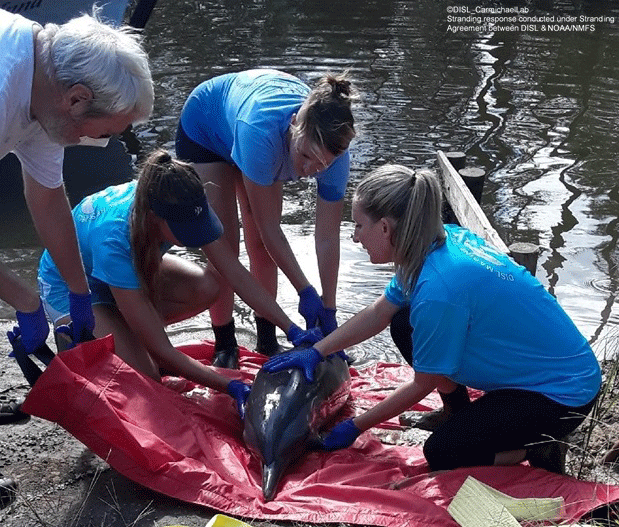
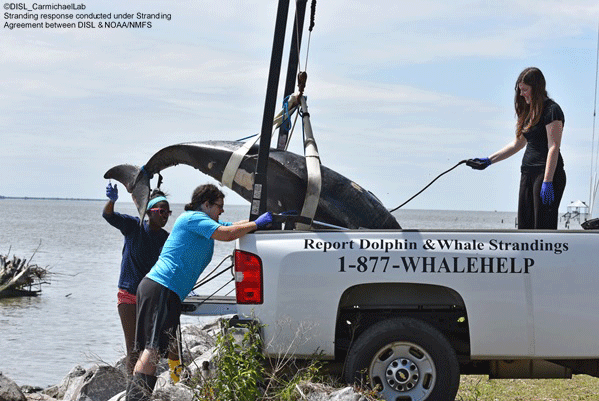
The primary goals of ALMMSN are to enhance reporting and response efforts for marine mammal strandings and to collect and disseminate high-quality data from stranding events to inform the management and conservation of marine mammals. We work with stranding network partners across the northern Gulf of Mexico to provide mutual aid for stranding response and collaborate on research efforts.
If you encounter a stranded, injured, or dead marine mammal, call 1-877-WHALE-HELP.
ALMMSN funders include the Alabama Department of Conservation and Natural Resources (ADCNR), NOAA Prescott Grant Program, Alabama Emergency Management Agency (AEMA), and the National Fish and Wildlife Foundation (NFWF).
Consortium for Advanced Research on Marine Mammal Health Assessment (CARMMHA)
CARMMHA is a team of marine mammal health scientists conducting cross-disciplinary research that includes veterinary assessments of managed animals, field assessments with wild populations, and integrative statistical modeling to understand how the Deepwater Horizon oil spill affected Gulf of Mexico marine mammal health.
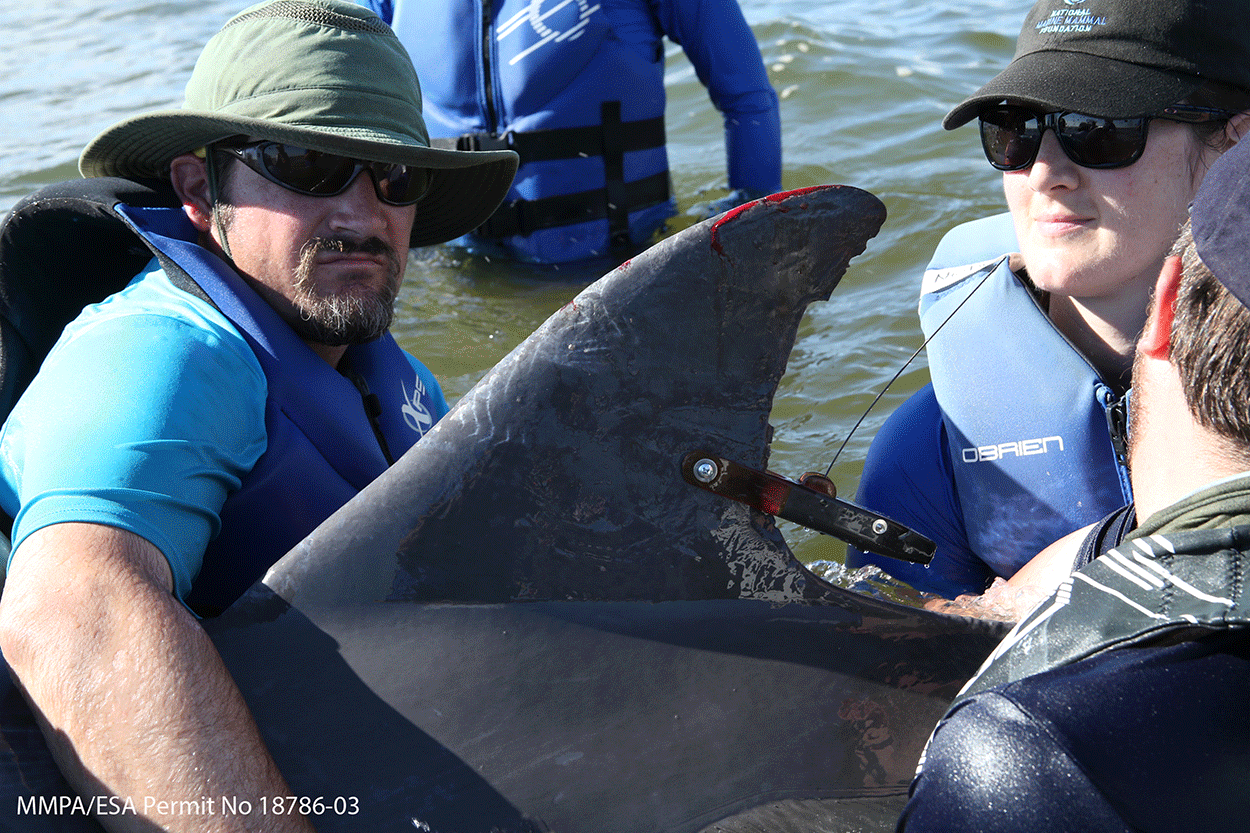
As part of the CARMMHA project, scientists at the Dauphin Island Sea Lab’s Marine Mammal Research Program are assessing dolphin tissues and prey species to better understand how dolphin diets may have changed during and after the Deepwater Horizon oil spill.
Consortium members include the National Marine Mammal Foundation, the University of St. Andrew’s Centre for Research into Ecological and Environmental Modelling (CREEM), NOAA National Marine Fisheries Service, Louisiana Department of Wildlife and Fisheries (LDWF), Chicago Zoological Society’s Sarasota Dolphin Research Program, University of Connecticut, and the University of Illinois. CARMMHA is funded by the Gulf of Mexico Research Initiative (GoMRI).
Bottlenose Dolphin Distribution and Abundance in Mobile Bay, Alabama
This project is assessing the status of bottlenose dolphins in Alabama state waters by collecting data on dolphin distribution, abundance, stock structure, habitat use, feeding habits, and potential environmental stressors. The work focuses on photo-ID mark-recapture surveys and biopsy darting in Mobile Bay, Perdido Bay, and nearshore Alabama waters.
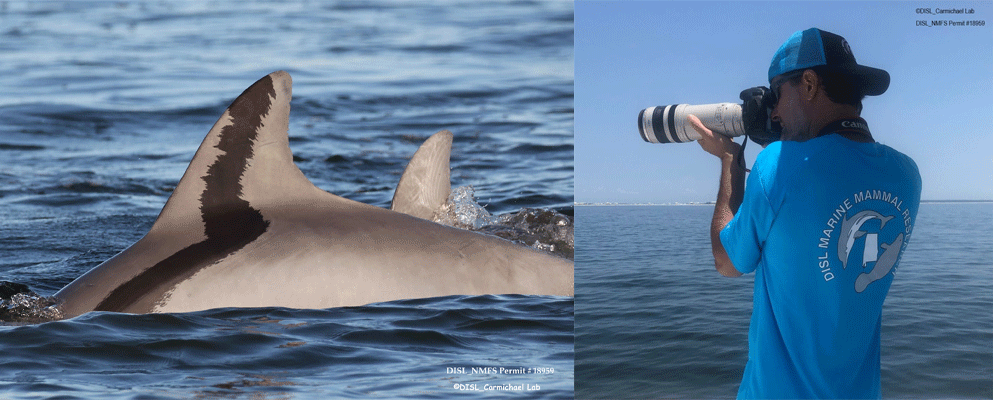
This project is a collaboration with the NOAA NMFS Southeast Fisheries Science Center in Pascagoula and the Alabama Department of Conservation and Natural Resources (ADCNR).